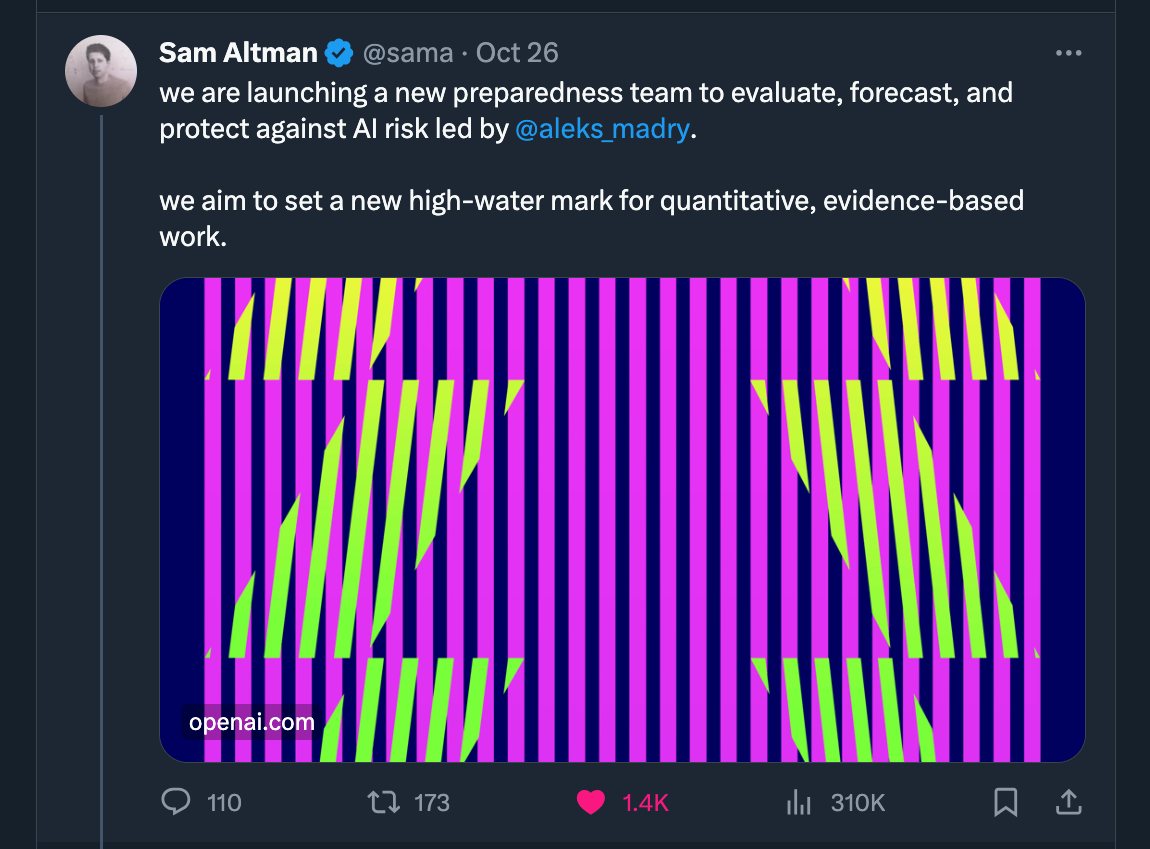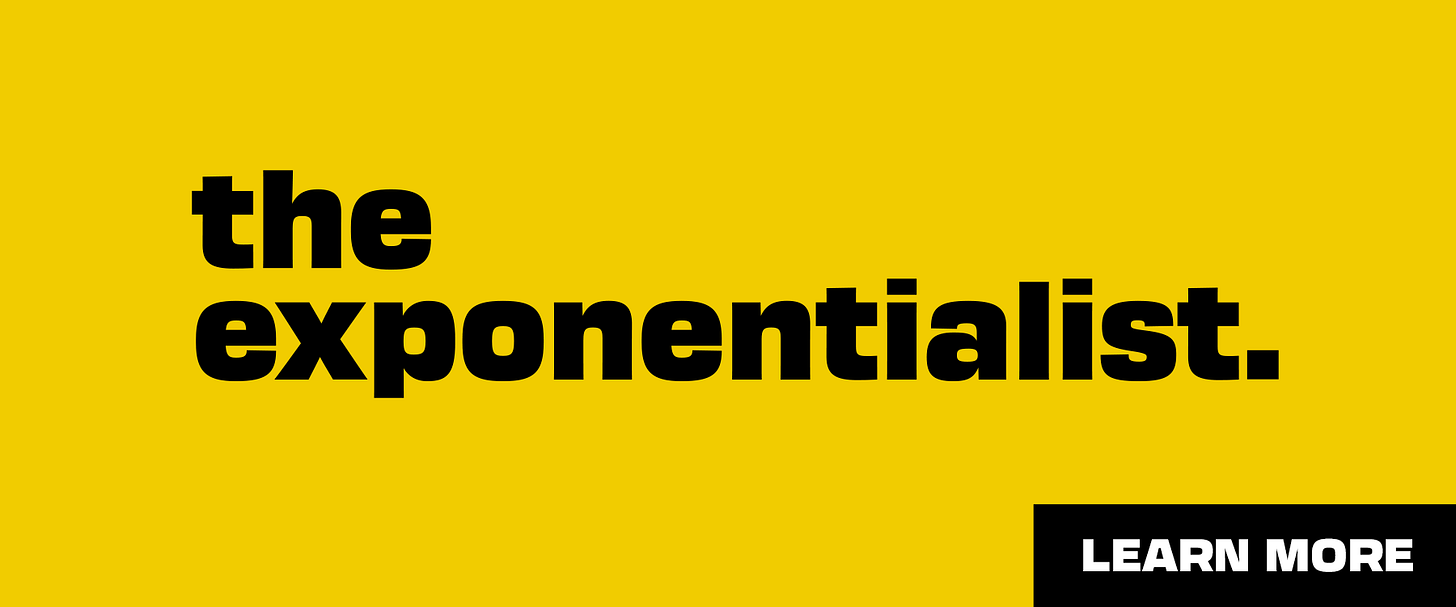Welcome to the mid-week update from New World Same Humans, a newsletter on trends, technology, and society by David Mattin.
If you’re reading this and haven’t yet subscribed, join 25,000+ curious souls on a journey to build a better future 🚀🔮
To Begin
This week, two intriguing stories and a big announcement.
Global leaders and senior tech executives gathered at the UK’s AI Safety Summit. But beyond the walls of Bletchley Park, the debate on AI is raging hotter than ever.
Meanwhile, tech billionaires in Silicon Valley are running into trouble over their plans to build a new city-state utopia called California Forever.
As for the announcement? Just keep scrolling.
Let’s do this.
🧠 Dream machines
The UK government this week trumpeted the success of its international AI gathering; it took place at the historic fountainhead of the computer revolution, Bletchley Park.
An impressive guest list, including US vice-president Kamala Harris and the European Commission president Ursula von der Leyen, gathered at the Summit. And their meeting resulted in the Bletchley Declaration, which the UK government has hailed as a world-first international statement on AI safety.
Here’s a taste for those who speak technocrat:
‘We affirm that, whilst safety must be considered across the AI lifecycle, actors developing frontier AI capabilities, in particular those AI systems which are unusually powerful and potentially harmful, have a particularly strong responsibility for ensuring the safety of these AI systems…We encourage all relevant actors to provide context-appropriate transparency and accountability on their plans to measure, monitor and mitigate potentially harmful capabilities and the associated effects that may emerge…’
But beyond the Declaration, this week made it clear that we’re further than ever from a consensus on the deep implications of machine intelligence. In fact, this was the week that a maximum volume war of words broke out between leading AI builders.
Google Brain co-founder and Stanford professor Andrew Ng said key AI players, including Sam Altman, are wildly playing up fears of AI doom in order to spark regulation that will suppress competition from insurgents. He called the proposal that the training of powerful AI models should require a license ‘colossally dumb’.
That message was echoed by Meta’s chief AI scientist Yann LeCun, who favours open source — that is, anyone can use it — AI models.
But Google DeepMind CEO Demis Hassabis hit back at LeCunn, saying that failure to regulate AI could result in ‘grim’ consequences for humanity.
This account barely scratches the surface of the arguments that raged this week.
As for OpenAI, they launched a new team intended to study and prepare for ‘catastrophic risks’ including an AI-instigated nuclear war.
⚡ NWSH Take: Who would ever have thought that a bunch of super-smart, tech-obsessed social media addicts would end up arguing like this? While Bletchley saw a rare moment of diplomatic unity, inside the AI industry the full spectrum of opinion is manifest, from AI doom is all a load of rubbish to act now or the end of humanity is probable. // It pays, here, to remember that two things can be true at once. Yes, Altman’s global tour to warn of ‘catastrophic risks’ is a carefully orchestrated marketing campaign. But it’s also the case that no one, yet, has a definitive picture of the risks in play. // What is increasingly clear, though, is that the rise of machine intelligence is the primary fact of our shared lives now. It will do more than any other force to reshape our collective future. // But the Bletchley Declaration consists of bromides that will change nothing. And the sight at Bletchley this week of UK prime minister Rishi Sunak interviewing Elon Musk — positioning Musk as the star and Sunak as a fan — spoke volumes about the power imbalances we’ve allowed to evolve when it comes to government (i.e. the people) and unaccountable tech overlords. // We must recover our collective agency; our ability to assert human modes of living and being in the face of an ongoing technology revolution. That means doing politics. Bletchley was a start. But what’s needed next are citizen assemblies, and an authentic movement around AI for the people.
💥 The Exponentialist
As some of you will have seen on social media, I made a big announcement this week.
I’ve partnered with Raoul Pal, renowned macro-economic thinker and CEO of Real Vision, on a new premium research service called The Exponentialist.
This is a professional and enterprise-level service for those who want to go deep on emerging technologies, the futures they’ll create, and the challenges and opportunities latent in all that.
This won’t be for everyone in the NWSH community. But if you’re a foresight professional, strategist, founder, marketing leader, product manager, designer or much else besides, The Exponentialist will fuel you and your team. And it will take up only a fraction of your research budget.
It will also be deeply valuable for anyone seeking to position an investment portfolio around tech and crypto.
This launch changes nothing about New World Same Humans and the community we’re building here. Our mission continues unchanged!
If The Exponentialist sounds useful, go here to learn more. And if you’ve subscribed or you’re considering it, hit reply to this email so I can say thanks.
🏙 Now and Forever
While the newsletter was on pause, we learned that a group of Silicon Valley billionaires are planning a new city-state utopia in California. This week, it seems their project has run into trouble.
California Forever is a new city planned for construction in Solano County in the north of the state. It’s backed by some of tech’s most notable power players, including ultra-rich VC Marc Andreessen, Stripe founders Patrick and John Collison, and LinkedIn founder Reid Hoffman.
The group’s vision for the city has strong solar punk, hi-tech sustainable utopia vibes:
But this week it was reported that the mysterious company behind the plans, Flannery Associates, is accused of using ‘strong-arm tactics’ including lease terminations to buy up the Bay Area farmland it needs. Local farmers aren’t happy, and now some of them are taking the matter to court.
Trouble in (planned) paradise, then.
⚡ NWSH Take: This project reminds me of the various other pseudo-independent city-states discussed in this newsletter over the years. There’s Walmart billionaire Marc Lore’s Telosa City, for example, a sustainable paradise planned for the Nevada desert. And Praxis, a startup on a mission to build a new Great City somewhere in the Mediterranean, funded by NFTs of the monuments they’ll build in the city once it exists. // Few details have emerged of the way California Forever will be governed. But for a glimpse, we might turn to billionaire backer Marc Andreessen’s recent’s Techno-Optimist Manifesto, which proclaims: ‘we believe in ambition, aggression, persistence, relentlessness — strength.’ I’m thinking libertarian, with a strong emphasis on innovation and startup culture. // Of course, innovation and startups can be great. But they only function in the context of the broader socio-political frameworks that libertarians such as Andreessen repudiate. As with the other charter city projects covered in this newsletter, I can’t help feeling that at the heart of Forever California is a fantasy of permanent escape from politics. Escape, that is, from the messy, awkward business of managing conflict among different interest groups, and enacting trade-offs between different but equally legitimate value systems. This argument with the farmers might be the first public conflict that Forever California has run into, but it won’t be the last.
🗓️ Also this week
🎬 Hollywood actress Scarlett Johansson is suing an AI app for cloning her voice and using it in an advert. Johansson says Lisa AI: 90s Yearbook and Avatar used an AI version of her voice without permission.
Last week I wrote on the coming wave of legal disputes over AI outputs founded in copyrighted intellectual property, including Universal Music Group’s lawsuit against Anthropic. UMG say Anthropic used their lyrics to help train its AI chatbot Claude.
🌨 Tesla drivers say their Full Self Drive software is failing because the car’s cameras are fogging up in cold weather. Back in 2021 Tesla ditched the Lidar sensors that usually form part of self-driving systems, leaving their self-drive reliant on cameras.
👾 The Pentagon launched a new UFO reporting tool. The secure online form is open only to current or former federal employees, or those with ‘direct knowledge of US government programs or activities related to UAP dating back to 1945’.
🇨🇳 Researchers from the Chinese microchip company MakeSens say they’ve created a chip that can perform certain AI tasks 3,000 times faster than the Nvidia A100. Writing in the journal Nature, the researchers say the All-Analogue Chip Combining Electronics and Light could soon be used in wearable devices, electric cars or smart factories. The US have restricted sales to China of Nvidia’s leading A100 AI chip, leaving the country scrabbling to bolster domestic production capabilities.
🪐 NASA is locating buried ice on Mars by using a sophisticated new map. The Subsurface Water Ice Mapping project uses images of the planet from several NASA missions, including the 2001 Mars Odyssey satellite. The Agency says subsurface ice can serve as drinking water for the first humans to set foot on the Red Planet.
🌅 A new study says that the Earth’s climate is more sensitive to carbon emissions than most scientists believe. Published in the journal Oxford Open Climate Change, the study says a doubling of atmospheric C02 will cause a 4.8C rise in average global temperatures, and not the 3C rise that current mainstream thinking forecasts.
🤖 Boston Dynamics turned its robot dog, Spot, into a tour guide by integrating it with ChatGPT. I’ve covered the evolution of Spot since the earliest days of this newsletter, and it would seem rude to stop now.
🕸 Scientists say they added spider DNA to silkworms and it resulted in silk that is stronger than kevlar. The gene-edited silkworms create a silk six times stronger than kevlar, which could one day be used in surgical sutures and armoured vests.
🌍 Humans of Earth
Key metrics to help you keep track of Project Human.
🙋 Global population: 8,070,681,872
🌊 Earths currently needed: 1.8455
🗓️ 2023 progress bar: 84% complete
📖 On this day: On 4 November 1847 a Scottish physician, James Young Simpson, discovers the anaesthetic properties of chloroform.
City on the Hill
Thanks for reading this week.
The dream that is a shining City on the Hill — an example to all the world — is ancient. And our quest to build such cities in the 21st-century is a classic case of new world, same humans.
This newsletter will keep watching, and working to make sense of it all.
Now you’ve reached the end of this week’s instalment, why not forward the email to someone who’d also enjoy it? Or share it across one of your social networks, with a note on why you found it valuable. Remember: the larger and more diverse the NWSH community becomes, the better for all of us.
I’ll be back next week with another postcard from the new world. Until then, be well,
David.
P.S Huge thanks to Nikki Ritmeijer for the illustration at the top of this email. And to Monique van Dusseldorp for additional research and analysis.
















